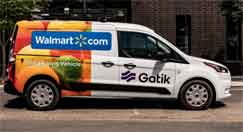eCommerce remains unprofitable for many companies, including Walmart, so anything that can reduce costs will be looked at with great interest.
That certainly includes autonomous trucks, with the promise of driverless deliveries – a major component of fulfillment costs.
Supply Chain Digest Says... |
|
|
But the technology is evolving, and the regulatory environment is behind the tech. And just how autonomous trucks can best be deployed isn't clear.
But the answer to that question may be the "middle miles."
That in fact was the concept Walmart was promoting during a recent demonstration for the press of driverless technology in Rogers, Arkansas.
According to a report from Bloomberg ( Keith Naughton and Matthew Boyle), that demonstration involved three Ford delivery vans using with self-driving technology developed by a company called Gatik, a Silicon Valley startup.
Gatik has been given a target: reduce the costs for Walmart's middle mile fulfillment by half.
What are middle miles? Business to business moves from warehouse to warehouse or to a pickup point, getting order closer but not all the way to consumers. It also includes the middle parts of long-haul routes handled today be truckload carriers.
Says Gartner analyst Mike Ramsey, "This area has the least number of obstacles and the most certain return on invested capital in the near term. If you're looking to start a business where you can actually generate revenue, this has fewer barriers than the taxi market" for freight.
Bloomberg says this middle miles transport may soon develop into a $1 trillion market, though does not explain how experts get to that number.
The big advantage for a middle mile automation focus: it doesn't involve all the delivery complexities that shipments all the way to a consumer's home require.
"Robo-vans like those being put to the test at Walmart follow fixed routes over and over, reducing the chance of mishaps and increasing their time in service generating revenue," Bloomberg notes. "Many of these routes are already established using human drivers today, so there's little need to map new paths and create infrastructure to load and receive the goods."
(See More Below)
|
CATEGORY SPONSOR: SOFTEON |
|
|
| |
|
|
Ford Motor Company, which is investing heavily in autonomous technology, uses the common logistics term "milk runs" to describe these consistent routes.
Bloomberg quotes Sherif Marakby, CEO of Ford's autonomous vehicles unit, as saying "Anything on driverless delivery that is a milk run is a good application for autonomy. B2C is a complex implementation for autonomy that will come with time, but B2B just makes it easier because you get volume and you can be more predictable."
 Technology companies are also turning investments towards this market after struggles over safety concerns for autonomous vehicles humans. And shipping cartons don't have the tendency to complain about their experience. Technology companies are also turning investments towards this market after struggles over safety concerns for autonomous vehicles humans. And shipping cartons don't have the tendency to complain about their experience.
A Swedish company called Einride recently began low-speed robo-deliveries on public roads, and has test agreements with companies including tire-maker Michelin, German grocer Lidl, and 3PL DB Schenker and.
Bloomberg days Einride's T-Pod trucks resemble a Star Wars Imperial troop transport on wheels. They are 60% cheaper to build than a normal truck because they lack a passenger compartment.
If they run into issues, the T-Pods can be remote controlled by humans from a command center, with one human able to remotely monitor up to 10 trucks. The T-Pods operate in self-driving mode 95% of the time, according to CEO Robert Falck.
And as opposed to humans, the T-Pods can work round the clock, with no hours of service rules to worry about.
Another company, TuSimple out of San Diego, is already valued at $1.1 billion, but is just one of a number of start-ups looking to automate long-haul carriage. TuSimple already has a fleet of 50 robot Peterbilt and Navistar trucks that have been transporting commercial loads in Arizona for a year using its technology.
In late May, TuSimple's self-driving truck, which leverage cameras that can see more than a half-mile down the road, completed 10 test runs for the US Postal Service on a challenging 1,000-mile stretch from Phoenix to Dallas.
And the conditions were not easy for much of the journey. Over Memorial Day weekend, the trucks faced howling crosswinds and "mud rain," a blinding combination of dust, wind and rain. Yet the robo-rigs consistently beat human-driven trucks to the mail depot by as much as two hours.
So it appears self-driving trucks really are coming, and focused on the middle-miles. Logistics will never be the same.
Will "middle mile" deliveries move autonomous trucking forward? Let us know your thoughts at the Feedback section below.
Your Comments/Feedback
|